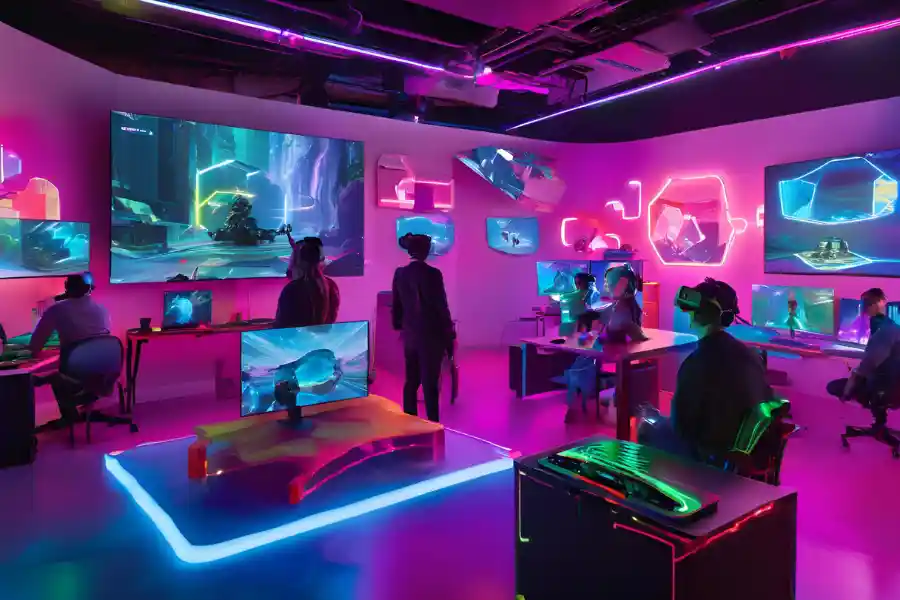Over the years, gaming technology has advanced highly, providing ever more sensible and thrilling games. At the forefront of this new era are virtual truth (VR) and artificial intelligence (AI), innovative technologies that have made distinguishing between reality and delusion tougher. AI-powered avatars that could study participant choices and VR environments interacting with players in digital worlds have multiplied and transformed the gaming scene.
This blog post will examine the development of AI and VR as the pair continues expanding its gaming potential and dominating gaming technology.
Early Days of AI and Gaming Technology
In the early days of computer gaming, Artificial Intelligence (AI) was quite essential. Developers created basic enemy actions and game interactions using straightforward techniques such as finite state machines and scripted actions. These early AI games, such as Pac-Man and Space Invaders, had regular enemy activity and planned patterns. However, these early artificial intelligence systems lacked variety and were unfit for adapting.
However, as computer technology advanced, coders started using more profound AI methods, such as neural networks. AI could learn and grow thanks to these new techniques, creating more reactive and difficult game opponents.
Evolution of Virtual Reality in Gaming
The adventure of Virtual Reality (VR) in gaming has seen massive adjustments and improvements. Early VR systems, like the Oculus Rift and HTC Vive, have been linked to robust computer systems and wished for a unique setup. While they supplied immersive reports, their high price and technical needs restrained their use.
Over time, the VR era has become more accessible and low-cost. Standalone VR headsets, including the Oculus Quest and PlayStation VR, permit gamers to revel in immersive experiences without needing a PC. These more modern devices have better decision, tracking, and luxury, making VR gaming fun.
Software for VR also has superior speed. Developers are locating new ways to maximize VR’s precise features, creating more excellent interactive and engaging video games. Today’s VR games offer an immersive revel in that conventional gaming can’t fit, displaying how VR shapes the destiny of interactive leisure.
Also Read: https://baddieshub.uk/4-best-ways-how-ai-is-transforming-the-economy/
Convergence of AI and Virtual Reality in Gaming Technology
The convergence of Artificial Intelligence (AI) and Virtual Reality (VR) is revolutionizing gaming technology, creating more fantastic immersive and dynamic experiences. By combining that technology, builders beautify digital worlds to be extra interactive and lifelike. AI improves VR by making non-playable characters (NPCs) act more realistically, adapting to player actions, and enriching sports surroundings. It also helps generate diverse virtual worlds, offering nearly limitless exploration.
In social gaming, AI-powered avatars interact naturally with players, fostering a sense of community. AI facilitates multiplayer interactions by matching players based on preferences and skills. The potential for innovative and engaging gaming experiences grows as AI and VR advance. This convergence is pushing the boundaries of gaming technology, promising a new era of immersive digital content.
AI and VR Integration in eSports
Integrating Artificial Intelligence (AI) and Virtual Reality (VR) is revolutionizing eSports and increasing its impact on diverse gaming sectors and sweepstakes casino apps. AI enhances player performance in eSports via reading records for personalized schooling, whilst VR gives immersive practice environments. For spectators, VR offers attractive perspectives of eSports occasions, and AI improves broadcast quality by highlighting key moments.
Although challenges such as high equipment costs and the need for specialized skills remain, the continued evolution of AI and VR is set to redefine both eSports and online gaming, making experiences more innovative and engaging.
Future of AI and VR in Gaming
There will be exciting changes in gaming technology with AI and virtual reality (VR). As these technologies develop, we will have events that are ever more genuine and deep. AI will produce unusual and dynamic games with highly accurate simulations. With new features like full-body tracking and improved haptic feedback, VR will push the limits of immersion and enhance gameplay. AI-powered personal gaming will become the norm, adapting to user likes, while virtual reality (VR) will enable richer conversations with more lifelike avatars. AI and VR gaming have a bright future ahead of them, full of exciting ideas that have yet to develop fully.
Conclusion
AI and Virtual Reality (VR) have uniquely changed gaming technology. These technologies now create more prosperous, more immersive experiences from simple beginnings. While VR creates available, attractive virtual worlds, AI adds dynamic elements and modifications to games for each player. AI ultimately changes eSports by enhancing spectator delight, conversation, and training. As these innovations continue to develop, future gaming promises to be even more unique, exciting, and active.
To get updates and learn more, visit our blog, baddieshub.uk.

Hi there! I’m Fran Candelera, an author at https://baddieshub.uk/ with over 30 years of experience. I am an artist and love playing with words and covering news, and I am Skilled in Academic Advising and Curriculum development. Join me on this writing journey, where I bring words to life in various exciting ways!






Leave a Reply